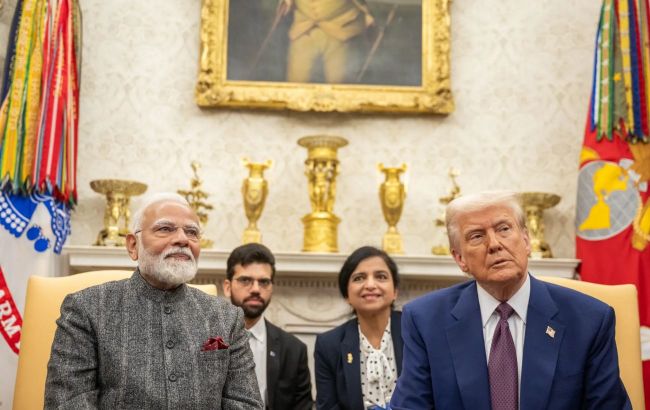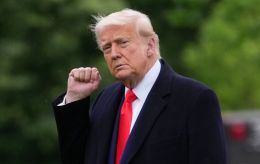Will Trump punish India over Putin’s oil? Can sanctions stop war in Ukraine
 Photo: Indian Prime Minister Narendra Modi and US President Donald Trump (whitehouse.gov)
Photo: Indian Prime Minister Narendra Modi and US President Donald Trump (whitehouse.gov)
US President Donald Trump recently announced the introduction of a 25% tariff on goods from India due to its purchase of Russian oil. Notably, one of the reasons behind this move is directly linked to Ukraine.
RBC-Ukraine explains whether this decision will play an important role in efforts to stop the Russia-Ukraine war.
Key questions
-
Trump imposes a 25% tariff on India
-
One reason: India’s purchase of cheap Russian oil
-
Trump is unhappy that oil money is funding the war against Ukraine
-
India is already reducing its imports of Russian oil
-
Trump’s strategy on Ukraine could work, but there’s a catch.
What Trump said about tariffs on India
On Wednesday, the US president announced that he would impose a 25% tariff on goods from India. It will take effect by the end of the week in addition to a "penalty" related to India’s purchase of cheap oil and military equipment from Russia. Essentially, these are secondary sanctions against Moscow.
According to him, India is a friend and strategic partner of the US, but trade between the countries is relatively small due to Indian tariffs and the "toughest and most unpleasant" trade barriers.
"Also, they have always bought a vast majority of their military equipment from Russia, and are Russia’s largest buyer of ENERGY, along with China, at a time when everyone wants Russia to STOP THE KILLING IN UKRAINE — ALL THINGS NOT GOOD! INDIA WILL THEREFORE BE PAYING A TARIFF OF 25%, PLUS A PENALTY FOR THE ABOVE, STARTING ON AUGUST FIRST," Trump wrote on the social network Truth Social.
Later, he hinted that there is still a chance to reach an agreement to avoid higher tariffs. And in his typical manner, he added, "You’ll find out by the end of the week."
Today, Trump made another sharp statement about India, this time in the context of a verbal dispute with Dmitry Medvedev, deputy head of the Russian Security Council.
Medvedev nervously reacted to the US president’s deadline for a peace agreement with Ukraine and said that every new ultimatum is allegedly a step toward war between Russia and the US.
Trump reminded him of his own presidential term, said that Medvedev "stepped into very dangerous territory," and advised him to watch his words.
"I don't care what India does with Russia. They can take their dead economies down together, for all I care. We have done very little business with India, their Tariffs are too high, among the highest in the World," the president added.
How India reacted to Trump’s statements
Trump’s announcement came just days before the deadline for new trade agreements. India was among the first to begin negotiations with the US. Back in April, US Vice President J.D. Vance, during a visit to the country, announced the agreement on a "scope of authority" for negotiations.
India has some of the highest import tariffs among major economies, with an average rate of about 17%. It has long used tariffs to protect millions of its farmers engaged in subsistence agriculture.
Agricultural trade has been the main obstacle in negotiations. India expressed concern over genetically modified crops grown in the US, as well as the US’s stance on dairy cows — a revered symbol in Hindu culture.
Prime Minister Narendra Modi’s government "has taken note" of Trump’s statement and is studying its consequences.
"The government will take all necessary steps to ensure our national interests, as was the case with other trade agreements," the statement said.
Meanwhile, according to Reuters, despite there still being a day until the deadline, there are already some consequences. In particular, state-owned oil refining companies Indian Oil Corp, Hindustan Petroleum, Bharat Petroleum, and Mangalore Refinery have already stopped purchasing Russian oil.
Since last week, they have been focusing on oil from Middle Eastern and West African countries. The companies and India’s Ministry of Petroleum have not officially commented on the situation yet. However, it is known that state refineries account for more than 60% of the country’s refining capacity.
Could Trump’s decision be part of his strategy regarding Ukraine?
Trump’s statements about India came after he had earlier given Russia a ten-day deadline to stop hostilities in Ukraine. The deadline expires next week — August 8.
Donald Trump is increasingly frustrated with Vladimir Putin as Russian forces continue missile and drone strikes on rear Ukrainian cities and press their offensive, undermining the White House’s peace efforts. If no peace deal is reached, secondary sanctions in the form of higher tariffs will be imposed on buyers of Russian oil.
Against this backdrop, some believe that Trump’s move toward tariffs on India is part of his new strategy to end the war in Ukraine.
Specifically, imposing tariffs on Russia’s partners who help keep its economy afloat, maintain its military potential, and finance the war could be a pressure tactic aimed at forcing Putin to genuinely come to the negotiating table — i.e., to pressure the Kremlin through its allies.
However, the Washington, D.C.-based research firm ClearView Energy Partners leans toward the view that Trump’s comments about India are more about pressuring for a bilateral trade deal rather than an attempt to truly influence Russia.
The firm’s analysis notes that trade pressure today does not preclude peace pressure tomorrow, and it would not bet against the added forecast of the economic power of buyers of Russian crude oil.
Secondary sanctions against buyers of Russian energy resources are being pushed by the Ukrainian side. According to this strategy, once Moscow stops receiving revenues, including from its cheap oil, it will agree to negotiations and an end to the war.
The problem is that these sanctions alone do not guarantee peace. However, combined with broader measures, they may become an important factor in pressuring Putin.
In particular, if effective, they could significantly reduce Kremlin revenues. The key question is whether India — along with China, Russia’s largest trading partner — will agree to such restrictions or seek ways to circumvent them.
For now, Moscow shows indifference and only intensifies missile and drone strikes on Ukraine. There are no real signs that these attacks might stop after August 8 or that Trump’s sanctions will have an effect.
Sources: materials from Reuters, Politico, Axios, and Newsweek.
Earlier, US Secretary of State Marco Rubio reported new negotiations with Putin’s inner circle about Ukraine but stated that there has been no progress.
Meanwhile, in Europe, it is believed that Donald Trump can still offer the Kremlin significant concessions and economic agreements in exchange for ending the war in Ukraine.

